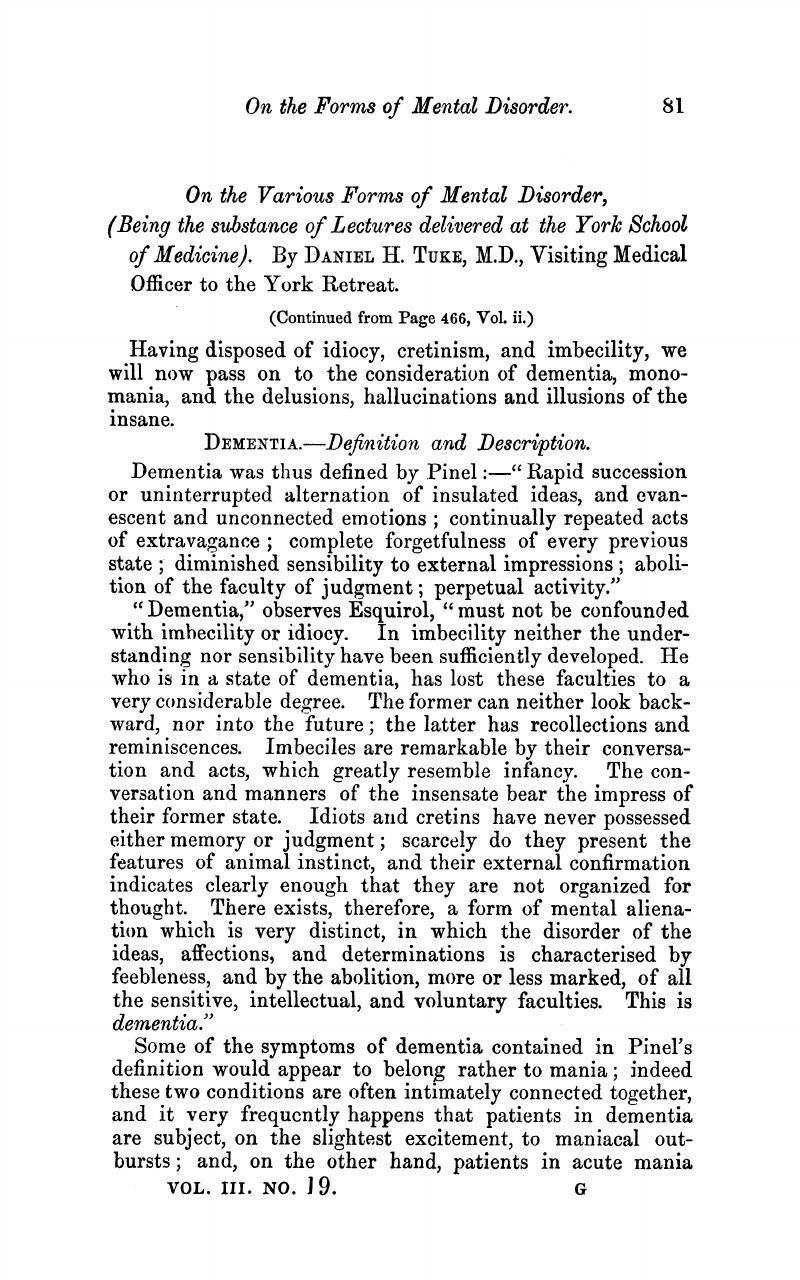No CrossRef data available.
Published online by Cambridge University Press: 02 January 2018

∗ “Maladies Mentales,” (Hunt's Edit.) p. 418.Google Scholar
∗ “Treatise on Insanity,” p. 96.Google Scholar
† Op. Cit., pp. 83, 89, et seq.Google Scholar
∗ Op. cit. p. 434.Google Scholar
∗ Vide “L'Heretier's Traité de Chim. path.” p. 596 Google Scholar
∗ Ην ϕόβος ἢ δυσθυμίη πολὺν χρóνον διατελέη, μελαγχολιϰòν τò τοιτον.Google Scholar
† Op. cit., p. 320.Google Scholar
∗ Esquirol, in reference to such cases, speaks of patients losing their personal identity. But this sense is, in reality, no mote lost than when the delusion has regard to some extraneous object. In fact, Brown draws one of his strongest arguments in favour of the universality of the consciousness of personal identity from the fact, that “even the very maniac, who conceives that he was yesterday emperor of the moon, believes that he is to-day the very person who had yesterday that empire.”—(Philosoplzy of the Human Mind, p. 83.)Google Scholar
† Van Swieten : cited by Arnold, vol. i, p. 127.Google Scholar
† Arnold, vol. i, pp. 124, 129, 133.Google Scholar
∗ Vol. i. p. 339.Google Scholar
† Another patient, equally deranged, thus described him in verse:—Google Scholar “A miracle, my friends, come view,Google Scholar A man, admit his own words true,Google Scholar Who lives without a soul;Google Scholar Nor liver, lungs, nor heart has he,Google Scholar Yet, sometimes, can as cheerful be,Google Scholar As if he had the whole!Google Scholar “His head (take his own words along)Google Scholar Now hard as iron, yet are longGoogle Scholar Is soft as any jelly:Google Scholar All burnt his sinews, and his lungs;Google Scholar Of his complaints, not fifty tonguesGoogle Scholar Could find enough to tell ye.Google Scholar “Yet he who paints his likeness here,Google Scholar Has just as much himself to fear;Google Scholar He's wrong. from top to toe:Google Scholar Ah! friends, pray help us, if you can,Google Scholar And make us each again a man,Google Scholar That we from hence may go.”Google Scholar
—Description of the Retreat, p. 152.
∗ Paulus Ægineta, vol. i. p. 390.Google Scholar
† “Des Hallucinations,” p. 327.Google Scholar
∗ “Maladies Mentales,” vol. i. p. 522.Google Scholar
∗ “Life of Cellini,” vol. i. p. 499.Google Scholar
∗ “Des Hallucinations,” p. 86.Google Scholar
† Ib., p. 89.Google Scholar
∗ Vide on this subject, Wigan, “on the Duality of the Mind.”Google Scholar
∗ “Des Hallucinations,” p. 94.Google Scholar
∗ Vide Arnold, p. 130.Google Scholar
† “Des Hallucinations,” p. 493.Google Scholar
∗ Vide Arnold, p. 130.Google Scholar
† “Des Hallucinations,” p. 493.Google Scholar